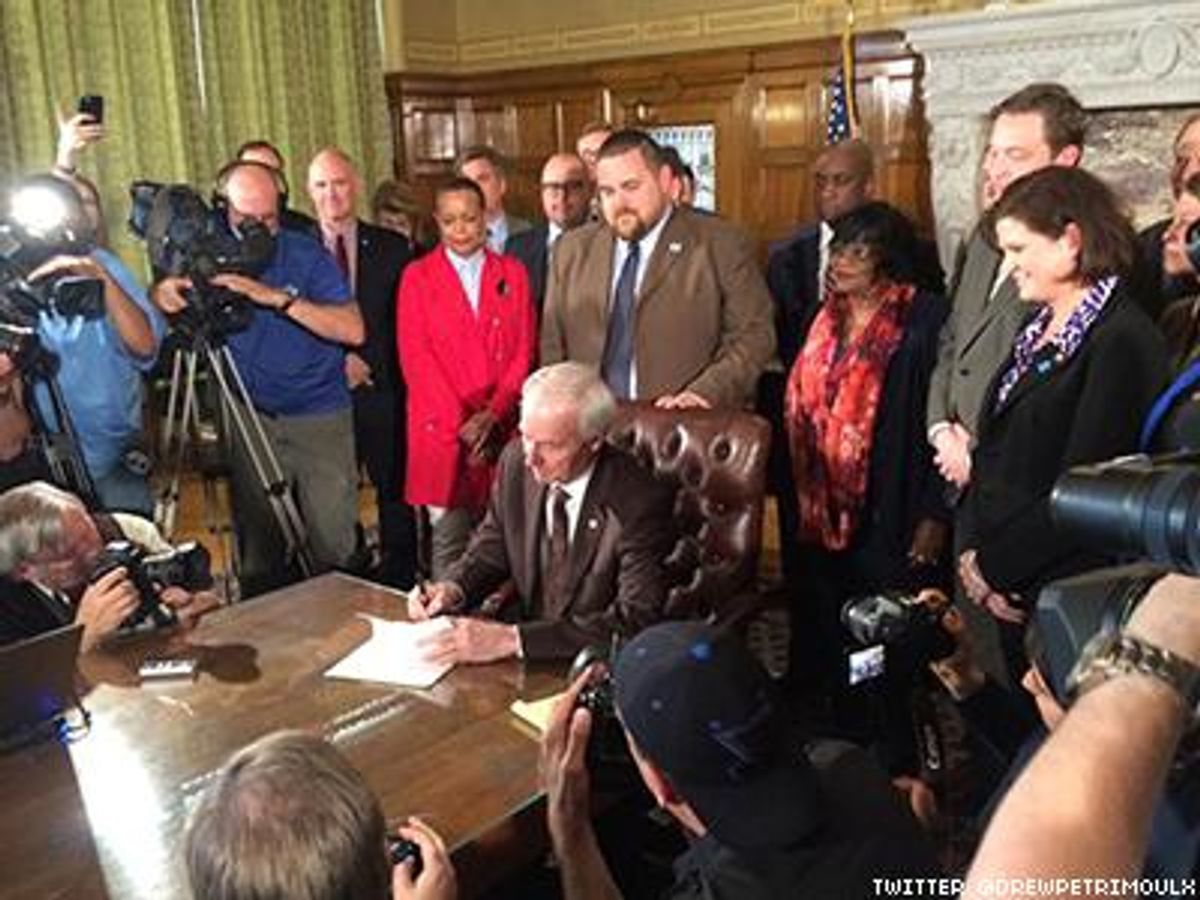Arkansas Gov. Asa Hutchinson has signed into law a revised version of his state's Religious Freedom Restoration Act, after asking lawmakers to amend an earlier version so that it more closely mirrored similar federal legislation.
Hutchinson signed Senate Bill 975 into law Thursday afternoon, just hours after the updated bill passed out of the state House by a vote of 76-17, according to local TV station KHBS.
Numerous outlets report that SB 975 was hastily drafted as an updated version of SB 1228, a more broad bill claiming to protect "religious freedom" that many worried would amount to a "license to discriminate."
The legislation as signed into law by the governor takes effect immediately. As with similar legislation -- including the federal RFRA, enacted by President Clinton in 1993 -- the Arkansas law does not mention sexual orientation or gender identity explicitly.
Unlike the earlier version presented to the governor Monday, the new law seems to limit the scope of who can file a claim alleging that their "free exercise of religion" has been "substantially burdened" to religious organizations or institutions which can demonstrate that the government has hindered their ability to practice their faith. The legislation as passed does not appear to apply to private or for-profit businesses or to individual actors, as SB 1228 did.
The legislation does include an "emergency clause," which states that the General Assembly has determined "that there is not a higher protection offered by the state than the protection of a person's right to religious freedom; and that this act is immediately necessary because every day that a person's right to religious freedom is threatened is a day that the First Amendment to the United States Constitution is compromised."
The author of SB 1228, Rep. Bob Ballinger, told the Arkansas Democrat-Gazette that he thought his initial bill was "really good," but ultimately supported the passage of SB975, which he said is "essentially the Federal RFRA."
"What we've done is Arkansas-ized it I guess and made apply to Arkansas code," Ballinger told the Democrat-Gazette. "The misconceptions and confusion about [HB1228] have caused enough problems that we thought we'd go back to the drawing board. ... Go back to the essential purpose of bill to get a strict scrutiny standard. Our citizens when we're done are going to be protected."
Because the original RFRA was passed by both chambers of the state legislature and is still sitting on Gov. Hutchinson's desk, it could technically still become law. If the governor does not veto or sign the bill within five days of it arriving at his desk, it automatically becomes law. That's what happened with a bill barring localities from passing LGBT-inclusive nondiscrimination protections. The governor took no action on the bill -- which invalidates any local ordinances that protect against discrimination on grounds not listed in statewide law -- so it became law in February. Because Arkansas's statewide nondiscrimination laws do not cover discrimination based on sexual orientation or gender identity, the new law effectively prohibits cities and towns from electing to protect their LGBT citizens from discrimination in employment, housing, education, and public accommodations.
Human Rights Campaign president Chad Griffin, a native of Arkansas, urged Hutchinson to recall the earlier RFRA and to support statewide antidiscrimination protections for LGBT Arkansans. "The people of Arkansas spoke up in opposition to a discriminatory, mean-spirited bill, and the state's leaders backed away from the cliff," Griffin said in a prepared statement. "Today, LGBT Arkansans are still unequal, and today's battle points toward a broader struggle ahead -- a fight where full and complete equality for all Arkansans that cannot be undermined is the only acceptable outcome. Today, we double down on that commitment, and those fighting for equality in the Natural State should feel encouraged that their efforts can and do make a difference."
Added HRC legal director Sarah Warbelow: "The fact remains that the only way to ensure LGBT Arkansans are treated equally under state law is to add explicit protections for them. Moving forward, Arkansas should explicitly clarify that the RFRA cannot be used to undermine nondiscrimination protections at any level. In addition, all states and the federal government should provide explicit nondiscrimination protections on the basis of sexual orientation and gender identity."
The American Civil Liberties Union called the new bill an imperfect solution, saying it could still be used to justify discrimination. "We are grateful that Gov. Hutchinson and members of the General Assembly have listened to the loud outcry in opposition to HB 1228 and have enacted a new proposal," said a statement from Rita Sklar, executive director of the ACLU of Arkansas. "But this new law fails to protect against the use of religion to discriminate against and harm others. Religious liberty is a fundamental value that the ACLU of Arkansas has been working to uphold since 1969. We will be vigilant and ensure that the shield of religious freedom doesn't become a sword used to harm others in the State of Arkansas."
This story is developing. Check back for updates.














































































